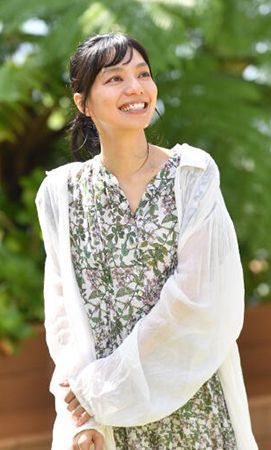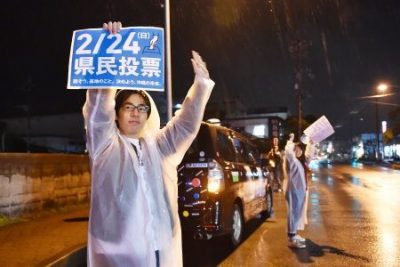Cocco explains the reason she continues to sing, talks about the song “2・24” from her new album

“My driving force is the idea of handing the baton off to the next generation,” says Cocco at the Ryukyu Shimpo offices in Naha
November 8, 2019 Ryukyu Shimpo
Cocco, who celebrated the 20th anniversary of her debut in 2017, released her 10th studio album, StarShank, in October (3,000 yen before tax, Victor Entertainment).
Released three years after the release of her previous album, Adan Ballet, Cocco once again teamed up with producer Takamune Negishi, who has worked with her on the creation of countless songs since her debut.
She will soon set out on a nationwide six-stop tour, starting in Miyagi prefecture December 6. We recently caught up with the singer (interview by Kengo Fujimura).
– What have you been up to since your last album?
“I’ve been keeping to myself, doing things like writing songs for other artists. When I am out walking with my 20-year-old son, we are mistaken for a couple, and I’ve had people try to scout me as a model.
The person who approached me was young, and might not know Cocco, and it made me think, “Maybe I’ve been reborn.”
– Can you write songs even while staying secluded?
“I can. For me, [writing songs] is like a physiological phenomenon, like when you have to go to the bathroom after waking up, so I don’t think about it too much.
I write songs every day. So, when a request comes in for me to write a song, my reaction is, ‘Well, I have today’s song.’”
– Tell us about the thoughts that went into the song “2・24,” which refers to February 24 (2/24), the day of the referendum vote in Okinawa asking if the citizens of Okinawa either approved to disapproved of the land reclamation work in Henoko for the new military base facilities.
“I think ‘2・24’ came from an idea just before the referendum vote, that we should defend ourselves as best we can, build a shield for our own defense.
In the end, even though the people of Okinawa said ‘No’ (to the new base facilities in Henoko), the government overruled that answer with a ‘Yes.’ In my 40 years, there are a lot of things I have given up on.
When it happens, there is a great sense of loss, pain, and crying. But, these children, who at around the same age as my son just earned the right to vote, earnestly believed that ‘the No might win.’
When they see what eventually happened, I think it came as a great shock to these young people, and they cried. We can’t seem to stop this situation that leads to young tears.”

Young activists standing in the rain calling for people to participate in the referendum vote on U.S. bases in Okinawa. February 24, 2019, Naha
– The land reclamation work started the day after the referendum vote.
“Even though there was strong opposition, I feel that what happened was to be expected. Since the government won’t change, we have to broaden our tolerance level. If continues to be obstinate and further harden their shells [it will never end].
Even if there is news about Henoko, I can’t watch. ‘It’s OK, we knew this would happen it’s ok,’ I say to protect myself, it is the best I can do.”
– You have been making efforts to support young artists, such as using young directors for your music videos.
“Now that I am older, there is no motivation left for me to sing for my own sake. I was 19 when I made my indie debut.
My own child is older than I was then. When I was 19, 20, countless adults helped me out, entrusting the baton to a girl from Okinawa who came to Tokyo, knowing nothing. Now that 22 years has passed I think I need to pass that baton down to the next person.
The landscape that was shown to me that allowed me to make music was fantastic, and I want to show it to the next person.”
– Who do you sing for now?
“When I was 19, I thought that I could change the world, and I believed that I could tell everyone no.
It would have been difficult to be recognized as the ‘real deal’ without the help of those who came before me.
So, my driving force is the idea of handing the baton off to the next generation, so that they can become ‘the real deal.’ However, I think the reason I can still sing is because I am singing for Okinawa.
I learned that because I am singing for someone, it is helping me keep going.”
– It is said that “People give up once they pass 40.” Isn’t that something that should be disparaging to young people?
“If young people don’t have hope, I don’t think we can hand the baton to them.
My skin has already accumulated enough scars and become thick [metaphorically speaking], but young people are still have skin that is soft and unscarred, and I worry about what lies ahead for them.
I want to support them as much as I can [with regards to the Henoko base construction issue].
If they are saying ‘No,’ then I will say ‘Certainly no, I am here to support you.’ If a sacrifice is needed, I am here for it.
Because otherwise it will be a repeat of when I was young and unscarred. I want to support them, and I want to protect them.”
(English translation by T&CT and Sam Grieb)
Previous Article:Elementary school pupils plant trees for later use as lumber to rebuild Shuri Castle
Next Article:Shiraho-Saonetabaru Cave Ruins, where 27-thousand-year-old human remains were found, to be designated a national Historic Site
[Similar Articles]
- Rock band Shores releases its first album called Beginning | End
- Okinawan singer Cocco keeps supporting children in disaster-affected area
- Namie Amuro makes a surprise announcement to leave the stage
- Mongol800 eyes the Asian market
- Okinawa poll finds 67.6 percent plan “no” vote in land reclamation referendum, greatly exceeding planned “yes” and “neither” votes
 Webcam(Kokusai Street)
Webcam(Kokusai Street)


